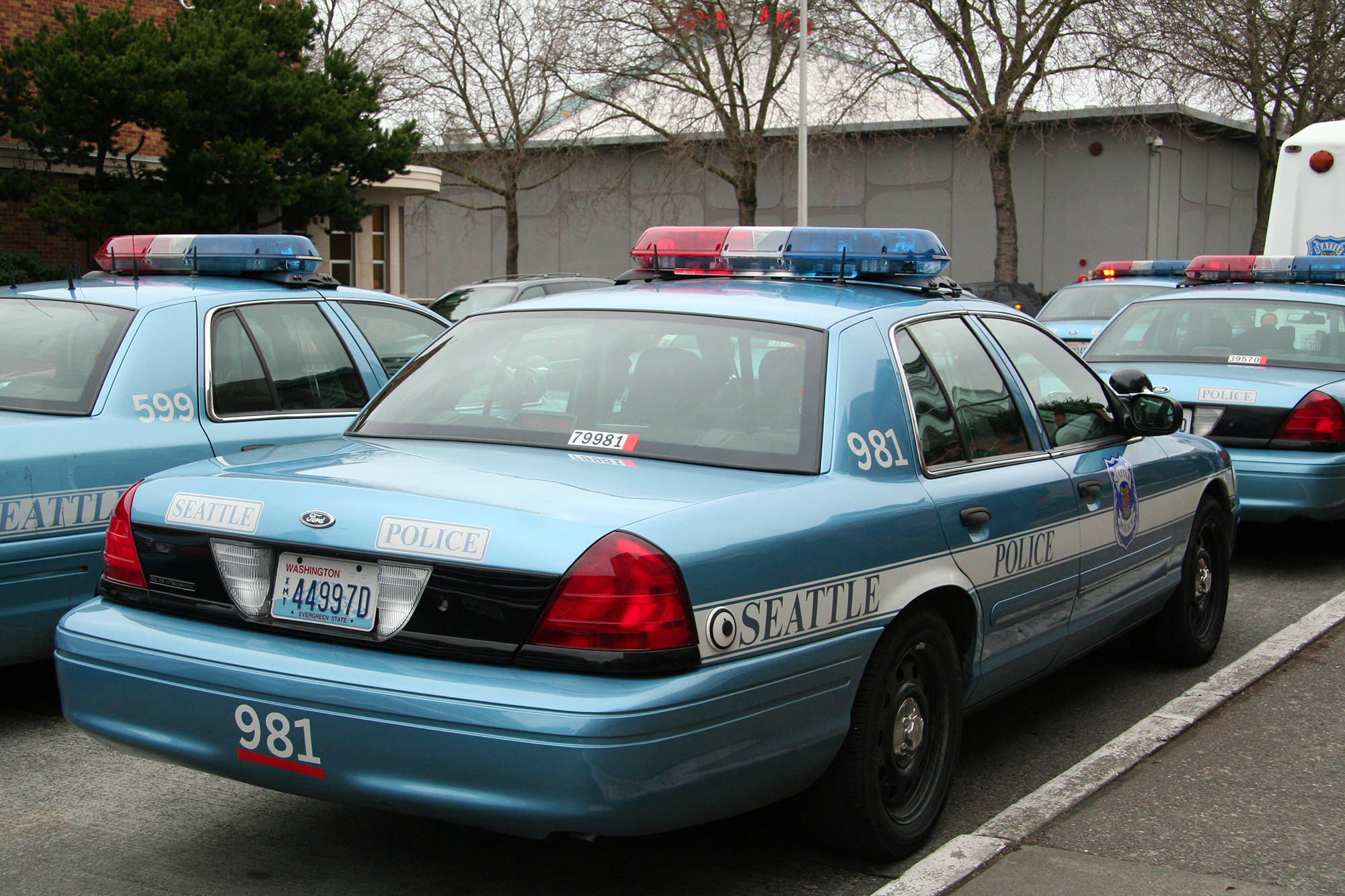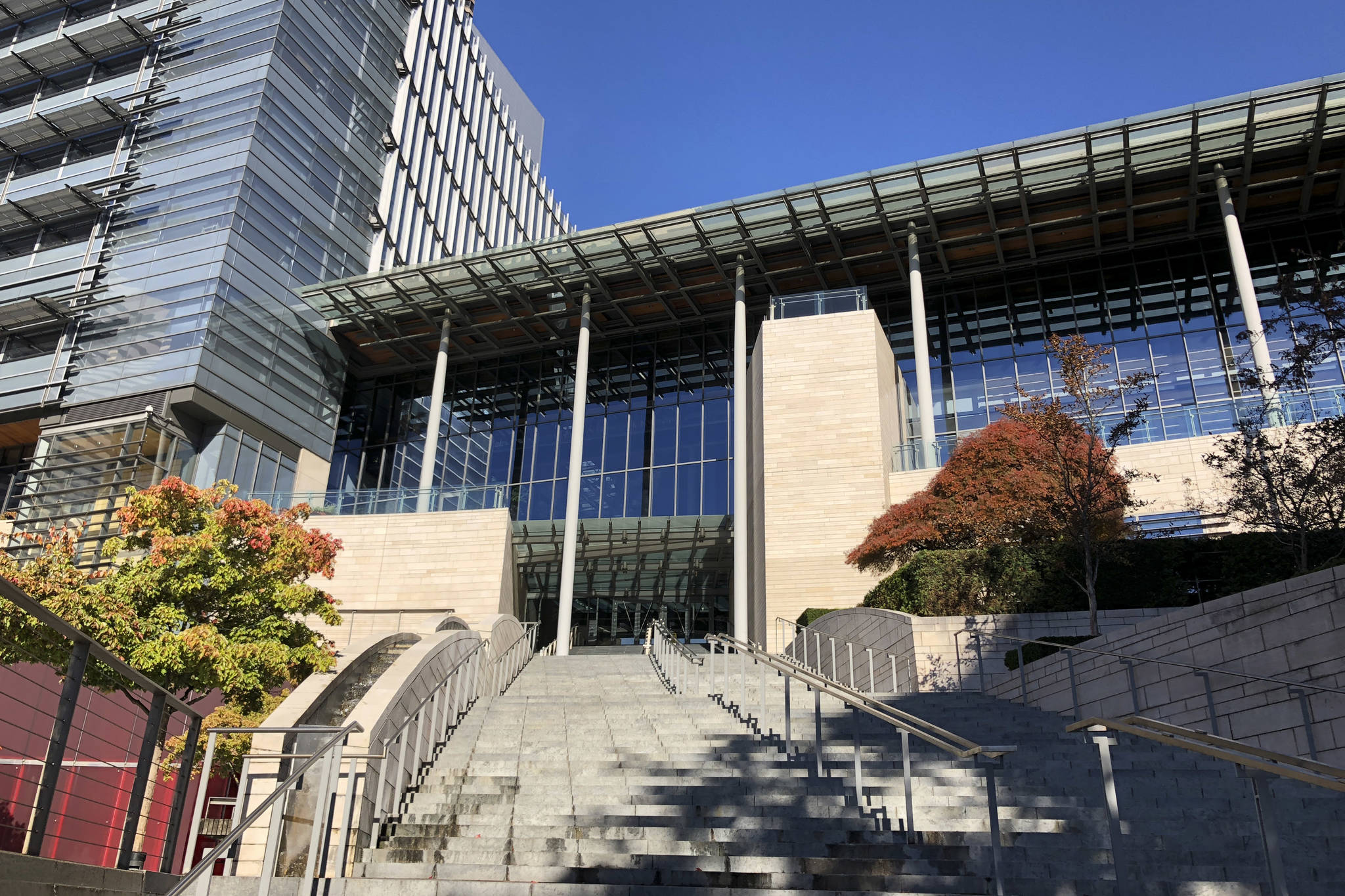A 2012 federal consent decree spurred the Seattle Police Department (SPD) to enhance the force’s transparency and accountability through bias-free trainings and policy changes. But a group charged with providing community input under the settlement agreement argues that the tentative contract between Seattle’s rank-and-file police union and the city would erode public trust in law enforcement.
In a Wednesday vote, the Community Police Commission (CPC) urged the Seattle City Council to reject the 100-page tentative agreement. During the public meeting in the Seattle Municipal Tower, CPC commissioners discussed scores of discrepancies between police accountability legislation passed last May and the tentative agreement that they felt negated their years of effort to gain public trust. On a white board behind them, the words “Overarching: [Collective bargaining agreement] undercuts legislation,” were written in black letters.
The legislation in question was designed to enhance police accountability and transparency by creating three oversight agencies for the Seattle Police Department (SPD), which included the Office of Police Accountability (OPA) — an agency led by law enforcement and civilians that investigates police misconduct complaints — and an independent auditor of the police called the Office of Inspector General. It also made permanent the CPC, which was established under the 2012 consent decree.
Despite the years of negotiation, the proposed contract would roll back the 2017 police accountability legislation, the CPC contended. Moreover, they argued that an appendix in the tentative contract — which states the document’s language will supersede the ordinance if contradictions arise — all but ensures it.
“We were not expecting a mirror image of our recommendations in the contract, but we were expecting that the weight of the work and the problems that it was trying to fix would be weighed seriously and heavily. And it wasn’t,” said Lisa Daugaard, a CPC commissioner and director of the Public Defender Association. “I would like the CPC to be able to support this contract because among other things, the men and women who work for the police department deserve a contract. They deserve a fair wage. They deserve this chapter to be over.”
The Seattle Police Officers Guild has gone four years without a contract and increased wages. If approved by the city council, the tentative agreement would be retroactively effective on Jan. 1, 2015 — the day after the previous contract expired in 2014 — until Dec. 31, 2020. According to Mayor Jenny Durkan’s office, Seattle’s largest police union voted 96 percent in approval of the proposed contract.
The CPC took issue with language in the ordinance that mandates all employees be held to the same standards of accountability, while the collective bargaining agreement (CBA) does not guarantee the same, the group noted in an annotated version of the agreement.
Additionally, the legislation established only one path to appeal police discipline through an impartial three-member body that guarantees open meetings called the Public Safety Civil Service Commission. The tentative agreement provides a second track for officers to contest disciplinary action through the additional option of arbitration hearings that are closed to the public.
As Seattle Weekly reported last year, opponents argue that arbitration hearings provide cops accused of misconduct with an avenue to keep their jobs. A 2017 Washington Post investigation revealed that since 2006, a quarter of the at least 1,881 officers fired for misconduct in the nation’s largest police departments had been reinstated through arbitrations.
In the eyes of the CPC, another point of contention is the time limit on police misconduct investigations. The Office of Police Accountability is allotted 180 days to investigate police misconduct, although the legislation allows officers to be disciplined after the deadline passes. It also grants extensions to the 180-day timeframe when new information is brought forward.
“The [collective bargaining agreement] rolls all of this back,” CPC Commissioner Isaac Ruiz said at Wednesday’s meeting. “We are back in the world where, if the investigation is not completed in the 180-day timeframe, discipline cannot be imposed. And provisions relating to the extension of the 180 days … become less clear and less certain.”
Undergirding the group’s concerns is the city’s need to demonstrate sustained reforms to complete the second phase of the consent decree. Last January, Seattle entered a two-year monitoring period in which the police must show a reduction in biased policing and the use of excessive force to be free of federal oversight.
U.S. District Judge James Robart, who is charged with overseeing the reforms, wrote in a 16-page ruling last year that the guild’s contract should not create changes to the accountability ordinance that would be inconsistent with the consent decree, otherwise “the city’s progress in Phase II will be imperiled.”
Durkan remains steadfast in her commitment to the police contract. “I respectfully disagree with the Community Police Commission. This contract advances both police reform and public safety. A failure to enact the contract jeopardizes both. The contract is also a question of fairness for the men and women of the Seattle Police Department who have been working without a contact or a raise since 2014. During that time, the cost of living in Seattle has skyrocketed, and the job we have asked them to do has gotten tougher. And they still showed up every day, instituted every reform, and as a result, the federal judge found them in full and effective compliance,” Durkan said in a statement emailed to Seattle Weekly.
“As U.S. Attorney, I led the investigation into the Seattle Police Department, and crafted and signed the Consent Decree. We pushed to have the Seattle Police Department lead the country, and they did. I have made clear we will not go backwards,” she added.
Under the tentative agreement, guild members would receive pay raises amounting to 3 percent for 2015 to 2017, 3.65 percent for 2018, 3.85 percent for 2019, and a percentage increase determined by the Consumer Price Index plus 1 percent for 2020. Employees required to wear body cameras would receive a 2 percent base pay increase. In exchange, guild members agreed to accountability reforms including the addition of civilians in the Office of Police Accountability and Human Resources leadership positions, the withdrawal of Unfair Labor Practice claims, and equipping front line officers with body-worn cameras.
Durkan isn’t the only one who disagrees with CPC’s actions. Although community activist Howard Gale concurs that guild’s contract endangers transparency and accountability, he argues that CPC left the public in the dark by not releasing a copy of the proposed contract after the group received it on Oct. 1.
In a letter to Gale rejecting his public record request a few days later, Assistant City Attorney Gary T. Smith cited a precedent that exempts documents used in labor negotiations until they are approved by the Seattle City Council. But Gale isn’t buying it. He provided Seattle Weekly with a copy of the lawsuit that he said he intends to file in the King County Superior Court unless the CPC and the city agree to one of the following requests (“well before the 20 days”): to not withhold from the public a union-approved contract again, or that the CPC must agree to release police union agreements in its possession in the future.
Meanwhile, labor groups are also voicing their disapproval of the CPC’s recommendation to the city council. MLK Labor will hold a noon Oct. 19 press conference at Seattle City Hall urging city councilmembers to pass the police union’s collective bargaining agreement.
“Police are working-class members of our community and, like all workers, they deserve a fair contract. This agreement is a historic step toward improving police accountability in our community. For the sake of our community and the brave men and women of the Seattle Police Department, the city council should approve the SPOG contract,” MLK Labor Executive Secretary-Teasurer Nicole Grant wrote in a statement emailed to Seattle Weekly.
Mhellmann@seattleweekly.com









